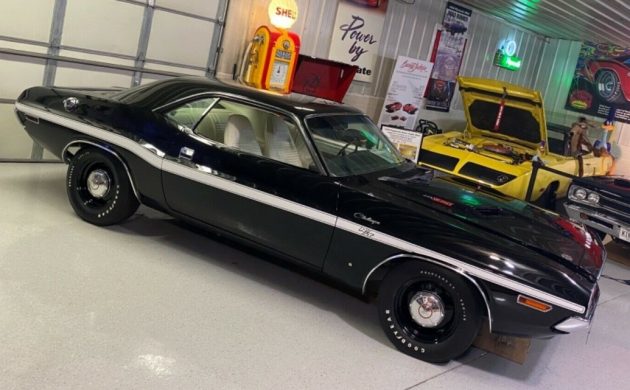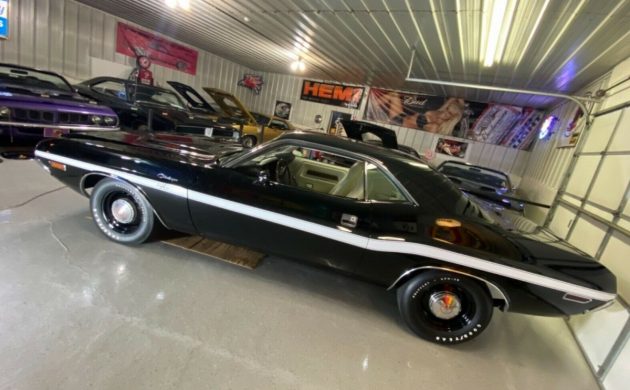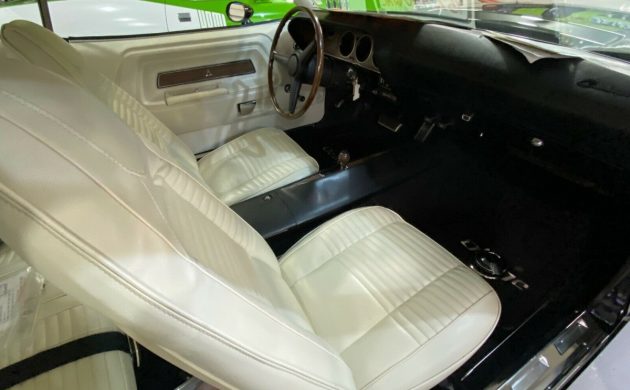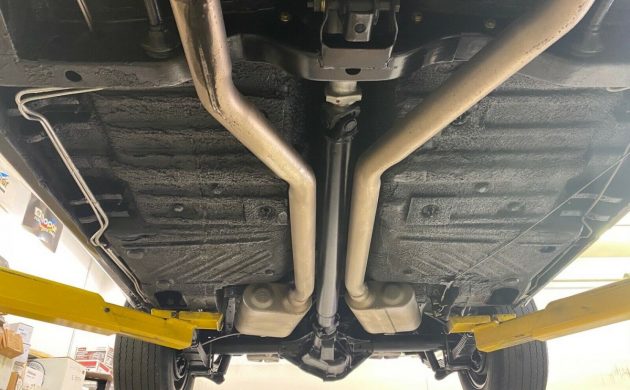1970-74 Dodge Challengers are some of the hottest cars on the collector market today. When you start drilling down from the standard model to the R/T to the R/T with a 440 6-pack to one finished in black and you end up with no more than 506 cars. So, to say the seller’s muscle car falls into rare territory 50 years later would be an understatement. This beautiful 1970 Challenger R/T comes with original owner history, although we don’t know that the seller is that person (may be a dealer that focuses on Mopars). But the Challenger can be seen in Prior Lake, Minnesota and it’s available here on eBay where the Buy It Now price is set at $73,440.
By 1970, Dodge was well-established in the muscle car game, but they didn’t have a pony car version until they rolled out the Challenger. It was a hit in its first year, selling nearly 77,000 copies. Unless you got the rare beast that had the 426 Hemi engine, the 440 6-Pack was your next most potent choice, and 1,640 Challenger R/T’s came that way. Production code JS23 meant that no more than 506 R/T’s came in black. Factor in the 440 and an automatic and a white interior and the seller’s car may have only been duplicated by the dozens. Production clarification courtesy of Cuda-Challenger.
It would be interesting to know the history of the seller’s car because – given that these machines were often run hard and put up wet – it has survived quite nicely. The body is straight with no evidence of rust anywhere, including the undercarriage which is nice and tidy. The paint is shiny with no noticeable imperfections. There is no mention if this car is original or a restoration, but it’s what you would expect for the asking price. The white and black interior is also exceptional.
We’re told the car runs and drives great with only 50,000 miles. It’s said to be a “real deal” 440 6-Pack, which would have been good for a whopping 390 horsepower. Adding to the rarity of the car is the inclusion of the Super Track Pack, which meant the car has a 4:10 Dana rear end. The seller will provide some documentation from the original owner and will accept trades (he’s looking for a Challenger Hemi or a Charger Hellcat and mentions that short-term financing is available for the acquisition).
Judging the resale value of a car like this is tough because it has so many drill downs. Challenger. R/T. 440 6-Pack. Several of these cars are for sale online with some combination of these features in excellent condition and they all seem to be running in six-figures. So, if the seller’s car is what he says it is, it may be priced at the bottom of the market.









390hp? Pfft, 490+ maybe. For ins. purposes, these were highly under rated. If you were around and not in diapers in the early 70’s, the ’70 Challenger was THE hottest stick, as mentioned. To be fair, it’s kind of splitting hairs what car was the fastest, and “Vanishing Point” sure helped Challenger sales, but I read, the 440, six pack was actually faster than the hemi, and a bit more manageable. Seeing what is being driven today, it’s pretty amazing to think, in 1970 you could walk into a Dodge dealer, with an average paying factory job, and drive off the lot with one of these. Not to beat a dead horse, but gonna cost you a hefty price, or what most here would consider hefty, to relive that experience today.
Bill( McCoskey) if you are reading this, don’t kid yourself, folks like us years ago, we had it made!
These cars weren’t special to the dealers in 1970. Wills Chrysler -Plymouth and Southland Dodge parked them as close to PA Route 51 as they could and they were white from salt after every snowstorm.
Wow my old stomping grounds! Folks purchased a 1969 Newport from Wills and I ended up working just up the street at Ron Koners Goodyear store. Later I move farther up to South Hills Ford.
I remeber seeing used ’67 shelby stangs parked the same way – back in the late 70s!
Imagine what would happen overnight THESE DAYS if a used car dealer had a shelby or even a half decent 318 chally on his lot.
Better to disconnect the neg bat cable instead of the pos one on this car.
Is that a functional outside air hood, or only if you got the shaker?
Sorry to disagree about the 440 being faster then a hem ( I was not in diapers, I was out ther). The hem was more
Difficult for lack of a better word, and definitely harder to drive and manage. But if you could tune a hemi, time it ri gh t, get the carbs right, and. The valves right, etc… they were pretty darned amazing. Problem was so many were bought by rich kids who didn’t know anything. ( just like today) so yes, in that situation a 440 would walk all over the hem. But that rare guy who knew how to work that hem motor was unbeatable. With that said, 440,s were really quick. Forgive the typos a d spell check mis spells, tablets do that
Yep Howard, I’m reading this too. If I was going to order a 1970 Challenger, this would probably how I would have done it, except for I would order 4-speed and if available with that engine, I would get factory A/C as well. And as for A/C equipped cars not winning, well mine did!
Your comment about the 440 being faster is very correct. My friends and I raced multiple Mopar cars back then, and without exception the 440 was a better choice if we wanted to win.
Today, I remember pulling out running 426 Hemi motors to replace them with 440 motors, and we had a difficult time getting rid of the hemi motors, a few got scrapped because we didn’t have room to store ’em [we were all still living at home with our parents].
Howard your right the 440 six was faster than the hemi.. Bad a$$ to the bone. Had a friends brother own one and seen it beat hemi’s at Cecil County drag strip more than once.
Nobody gets it here back when these cars were new tires did not hook. If and when you could get traction your car might have been faster that day. The hemi always will out perform a 440 because the heads are way better at putting air thru them.That’s why every top fuel car in the world still runs them. Crazy to argue about what work.she Hemi head is and always will be number one
I didn’t know that Chrysler switched to hydraulic lifter on the 70 hemi. Still, if set up and driven right, faster then a 440. I had a built goat at that time and I would run a 440, not a hemi. Don’t all start flaming me on the goat vs. 440. I would loose sometimes, and win some too. But car was not stock. I never bothered with a hemi
I drove a car just like this while in the employ of a Lincoln Mercury dealer in 1970. The car I drove was a stick. It was impossible to launch from a stand still. You could not get the tires to hook up. You needed a rolling start. This car was a beast! GLWTA!
The Challenger R/T 440+6 was no slouch, but, not faster than a HEMI powered version of itself. The same can be said in all instances of the same engine comparisons (440+6/HEMI) in 1970–1971 B and E body Mopars. In no way is that a criticism of the 440+6, on the street it was generally accepted that a 44+6 easier to keep in tune and live with. See below for times from magazine tests back in the day, from http://roadtests.tripod.com/
1970 Dodge Charger R/T (CL) 440ci/375hp, 3spd auto, 3.55, 0-60 – 6.4, 1/4 mile – 14.71 @ 96.67mph
1970 Dodge Challenger R/T (PHR) 440ci/390hp, 4spd, 4.10, 0-60 – n/a, 1/4 mile – 14.33 @ 99.88mph
1970 Dodge Challenger 340 (HC) 340ci/275hp, 4spd, 3.55, 0-60 – n/a, 1/4 mile – 14.55 @ 97mph
1970 Dodge Challenger R/T (CC) 440ci/390hp, 3spd auto, 3.2.3, 0-60 – n/a, 1/4 mile – 13.62 @ 104.28mph
1970 Dodge Challenger Convertible R/T (CL) 440ci/390hp, 4spd, 3.54, 0-60 – 7.1, 1/4 mile – 14.64 @ 97.82mph
1970 Dodge Challenger R/T (CD) 426ci/425hp, 3spd auto, 3.23, 0-60 – 5.8, 1/4 mile – 14. 10 @ 103.20mph
1970 Dodge Challenger SE (CC) 426ci/425hp, 4spd, 4.10, 0-60 – 6.3, 1/4 mile – 13. 10 @ 107.12mph
Statistics don’t factor in real drag race stats. Say what you what you want. I know what I witnessed and I’m not saying I’m right nor wrong, but I know what I seen. You believe what you believe and I’ll believe what I know. It’s
Statistics like ET and MPH for instance “don’t factor” you say. Well that’s an interesting theory but also gibberish.
Those contemporary “Statistics” above are from major car magazines done during testing on showroom stock press fleet cars done when the cars were new in 1970. I’m not saying a 440+6 car never beat a HEMI powered car in a drag race. Showroom stock the HEMI powered car was faster. Just because you choose not to believe factual information doesn’t make it untrue.
The numbers don’t factor in the driver, which is often the deciding factor in a heads up “race” between two closely matched cars. A couple of 10ths at the staring line, which is negligible to the eye, is worth a couple of car lengths at the finish line.
Steve R
Amen to a driver; they are THE difference! I owned a ’70 GTX 6bbl 440 w/a 4spd & 4.10
(at 19 years of age)
Driven by me…. fast!! My friend, an experienced driver, made it scary-fast!
Interesting to see that the 340 was actually quicker and faster than some of the big blocks.
Drivers aren’t a factor in magazine road tests, because they contracted with pros who knew how to get the most out of those Firestone Wide Ovals.
The 340 was a badass little engine, Dave. They were known to spank other make big blocks, too.
Any idea as to what rear end gear ratios those test cars had? HUGE factor. With out that info the numbers are questionable.
The axle ratios are all listed.
My bad, didn’t read the listings correctly.
Nick, thanks for digging up this data and presenting it here.
I’m still trying to figure out to this day how the 290? net hp
8.4 !! to 1 compression ’73 sd-455 bird with cast iron intake & quadrajet & 2 pipes into 1 heavy sideways muffler – got into the 13s.
Torque.
Steve R
Because a engine is a big air pump and that Pontiac was very efficient at pumping out massive power with those great heads bolted to that motor. Bump that compression up to 11 to 1 and it was a 600 plus horse motor. I great marvel of engineering.
I’m tired of seeing these once beautiful mopars being dressed down to look like sleepers , back in the day if you bought a new Cuda or Challenger in R/T, AAAR orT/A packages it was usually totally dressed out by the dealer.
Doug you’re having a hard time forming a coherent thought much less sentence and Steve is with you neck and neck on the inability to actually read and/or comprehend. What I referenced are times with a single car, with a test driver, at a drag strip. I specifically said it didn’t represent anything else.
Now one of you is jabbering from left field about “Factual statistics” not adding up to “facts” and the other is giving the lowdown on the driver being a factor as if nobody else would know that. Again you may have to actually read what I wrote but that seems to be beyond both of you MAGA men.
Nothing highlights a weak argument more than the random politicization of a thread that had neither made any political references or had anything to do with politics.
It’s obvious you have never spent much if any time behind the wheel of a car at a racetrack. Reading off magazine tests results from 1970 doesn’t prove anything. Many of the writers have commented on the discrepancies in the numbers, you may want to search that out. Start with Muscle Car Confidential by Joe Oldham.
Steve R
WTF Nick???
Yeah, want to throw political rocks too. But we are encouraged not to, please…Steve my memory from those magazine tests back in late 60s early 70s is that most testers had extreme issues getting the tires to hook up on the acceleration testing. Even seem to recall one (C&D) doing a story on how they would experiment with altering tire pressures in order to make the meats hook up on launch. My Bee would chirp the tires at 70 mph hitting 3rd gear. So yeah a lot of different factors at work for consideration here. Peace man!
Love the bench racing for a change, instead of complaining about incorrect door panels or the wrong location for certain badges. Nope, shes got the wrong washers!
Ha, they were all quick machines, factor in the built on Monday or Wednesday, track conditions, elevation, state of tune from previous press useage(ran hard, it’s not my car anyways), then the usual baseline run followed by tweaking like loosening or removing belts, air filter and lid,,, or the mysterious Hooker headers! The ET’s plunged and trap speed improved, sometimes greatly depending on the engine type itself. Those became the stated 1/4 mile times published and sometimes quoted over the next four decades. The six pack Road Runner Joe Oldham street raced for Cars magazine in 1969 ran mid to high thirteens at nearly 106 miles an hour. Heavy stuff then, another publication couldn’t break out of the 14’s with a similar car. Like the 426 Hemi published times… they vary quite a lot, as low as mid thirteens and I’ve also seen 15.yuck recorded for an early street Hemi.
I think it’s a good starting point but nobody ever raced dead stock cars, not if they wanted to win, in any era.
You are 100% correct. The nuances of a particular car, or test, are something you can’t get out of a magazine.
Steve R
You can get some, depending upon how a vehicle is tested. I recall a magazine road test between three 1970 Cudas, one with a Hemi, one with the 440 Six Pack, and one with the 340. The Six Pack car had manual steering and they made note that it was difficult to steer the car in city parking. They concluded that for most drivers the 340 was the better car. That may have been in Popular Science.
Bottom line is that anything is a reflection on the times in which it was made.
It’s funny how some vehicles cause people to lose their sense of perspective. This is a great site that features mostly cars but occasionally dives off into boats, aircraft, and jewelry. It’s the virtual equivalent to Forrest Gump’s box of chocolates.
@Steve R. Maybe. It is somewhat relevant regarding Doug’s blather, going on about homelessness (???), Factual statistics not adding up and he’ll believe what’s “real” in spite of anything else.
Actually I have spent time behind the wheel at both road courses and drag strips. And you?
Again a comprehension issue regarding the test numbers. I didn’t read them off I simply restated them, they are available for anyone to see though you seem to still misunderstand their context.
Unequivocally proven is that the best magazine published time for 1970 440+6 Challenger was slower than a 1970 HEMI Challenger. Nothing more and nothing less, no need for interpretation. No ifs. ands, or buts. Every single set of data for every car listed at http://roadtests.tripod.com/ proves something. They are self explanatory, unless you don’t understand them.
They are not inferring what may happen in a street race, at the strip or elsewhere or what any different driver may do in the same car. They are what they are.
I am familiar with that book, and many other sources of information available throughout the past 40 years, so you’re prompt to “search that out” may be a tad late.
Seriously guys?! Uhhh nice car..
Barn Finds turned into FB so gradually, we hardly noticed,,,
😂 Sad…
but somewhat accurate!
Beautiful car. Worth every penny. I had a hemi challenger bck in the mid 80’s. If it was I’m tune, no 440 was going to beat it. The problem with the hemi from my perspective, was that if you didn’t have experience or knowledge they were hard to keep in time. One big issue was gasoline. The hemi was meant to run on premium leaded gasoline and by this time was hard to find. You needed to put octane booster in every tank or it didn’t run it’s best. Never had a 440 6 pack car but had friends that did. A hemi car was the most fun driving I ever had. This car looks superb. Never a fan of the hubcap type wheels. Much rather prefer the Dodge valley wheels but that is just splitting hairs. Great color combination !!great price!! If that’s what you are looking for and you can afford it! That’s the car for you!! I will have to do some research, but I know about a year ago, I saw this car for sale in some publication. I never forget a desirable Mopar!!
I’m 21 just out if the Navy in January1969, in October my friend buys a 1970 Dodge Superbee 383, auto ps/pb no AC, green w/white C stripe. Loses his job I take up the notes on the car. The note was $97.00 and my insurance after a long search was $102.00 a MONTH. Not one of the big companies would touch it. Got married traded for a Toyota Corona MK II.
Thank you for your service! Insurance companies did the same thing to motorcycles, essentially charging what the bike cost new. Between that, and gas crises of the 1970s, those that weren’t taken off the roads wound up in junkyards.
My family owned a Chrysler/Plymouth dealer in Canton,Oh. in 1970> My uncle George took me then 15 for a ride in a 1970 HemiCuda 4-sp 4:10 gear and scared the crap out of me then. Wish I could have bought that car but dad said way to much car for me. He was right for sure.
Well, reading above, I always assumed top-dog was the HEMI, but I remember my older brother telling me that the HEMIs werre harder to keep in tune, and solid lifters ALWAYS had to be adjusted every 500 miles. I don’t know if the 440-six packs had solid lifters. Also, HEMI cars had heavy-duty EVERYTHING while you could pick and choose a little with the 440s. Also, the HEMIs were the base starting point for hot-rodders–you could do so much more to engine, while the 440-6pk. was pretty maxed out. Kind of like the FORD SEMI-HEMI 429’s–A well tuned 428 Cobra Jet would eat their lunch–UNLESS the SEMI-HEMI was prof. tuned.
David, by 1970 only the Hemi and the Slant Sixes had solid lifters. All 440s, four barrel or six barrel, had hydraulic lifters. The last non-Hemi Chrysler V8 was the 273.
A little Mopar trivia: in ’70 only the Hemi and the 340 had dual point distributors, and the 340 called for a half-step colder spark plug than did the Hemi.
There were three phases of the vaunted 426 street Hemi, right? ’66-’67, the improved ’68-’69 version, and then the ’70-’71. The last one there actually had hydraulic lifters with very heavy valve springs to keep the valves from floating and maintain high revs. Horsepower ratings went unchanged, like they were ever correct to begin with. Either engine, the Hemi or the six pack high performance 440, would scare the living sin out of most folks..
Wrong in 1970 the Hemi had hydraulic lifters. You people do not no nothing about these engines .
bottom line is the car is cool and fast and ill take 2..people argue over the dumbess stuff…..
Maybe I missed it in the description here, but the ad states NOM. Im assuming that means “Not or Non Original Motor”. Was it the intake manifold and three 2 barrel carbs that was the only difference between a 440 and a 440-6? Also that make the 74k buy it now price still a good deal? Thanks
Thank you NYjohn for the single most useful comment in this entire thread.
In answer to your questions, yes – NOM does mean non original motor.
The 440 six-pack included stouter HEMI valve springs and a recalibrated dual point distributor which the 4bbl engine did not have at the time.
All conjecture aside- I own a 440+6 that runs fantastic and two hemis, the hemis are faster for sure. The 440 is a little better out of the gate but the hemi pulls much stronger mid range and high end.
WTF man? your comment makes little sense. Like the last 4 yrs. PEACE man, no fraud, no collusion! (right) Fight me!
Gorgeous car in what looks like mopar nirvana.
Beautiful car and great write up. As stated above, horsepower ratings low for insurance purposes. Actual horse was rated at 430 in a write up I have, not quite the 490+ as stated in the first comment.
1970/71 426 Hemi came w/hyd. lifters. It come with the heavy mainweb block. Younger brother, has a 1971 Hemi Challenger R/T, bright red/white vinyl top, 36000 miles. Got a 1970 Challenger R/T, 440 4 BBL, sublime green W/ white vinyl top. B
All 4-speeds (18 spline). Love them both very much. Hemi will take the wedge every time. Same rear gears, (3,54 dana’s). The reason why, is that the Hemi has a wider RPM range. Wedge has good low end, Hemi has lot better top end, and RPM. Older brother has a 1969 GTX, 440/4-speed, solid bright red. I know a little about Mopars, all have trackpak option. We are Mopar only. Hemi takes more attention to detail to run like stink, the power is in the detail. Hooks up, awesome.